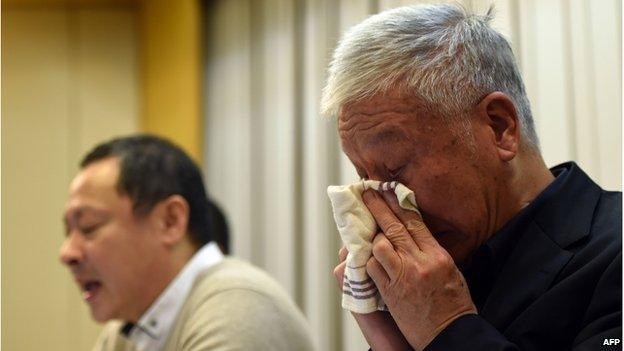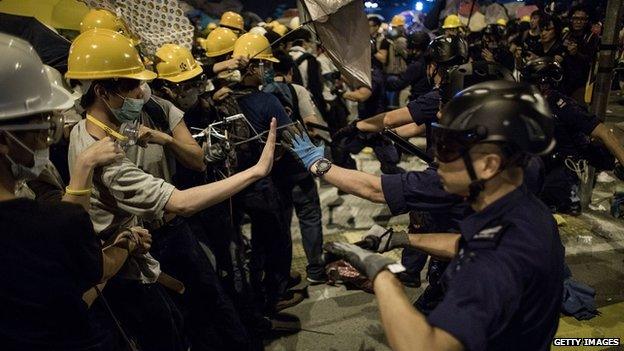Occupy Central urges Hong Kong protesters to retreat
- Published
Occupy Central founder Benny Tai: "To surrender is not an act of cowardice"
The co-founders of the Occupy Central movement in Hong Kong have repeated their call for protesters to retreat.
Benny Tai, Chan Kin-man and Chu Yiu-ming also said they would turn themselves in to police on Wednesday.
Occupy Central initially led the pro-democracy protests, but has receded as students continued with demonstrations.
Student leader Joshua Wong has begun a hunger strike to demand talks with the Hong Kong authorities over the movement's ideas for political reforms.
Occupy and the students want China to scrap its plans to screen candidates for the 2017 election for the territory's leadership. They want the Hong Kong government to renegotiate the arrangement with Beijing.

Analysis: John Sudworth, BBC News, Hong Kong
Protester: "I can't just stay at home"
If anyone hadn't noticed already, Hong Kong's pro-democracy protests are running out of energy and options. Benny Tai's announcement, actually planned for some time, simply confirms it. After two long months, the movement has achieved nothing in the way of concessions from Hong Kong's own government, let alone China's.
The cold wintry weather has arrived. Public support is ebbing away as the numbers at the damp protest sites dwindle further. The police are strengthening their resolve. So the risk - of arrest or injury - for those who remain is rising.
Benny Tai's appeal is a simple one. Quit while we're ahead, or at least, not already a complete failure. And the movement can, of course, claim some success. It has sent a resounding message - about an appetite for democratic reform that enjoys significant public support - to the wider world, and to Hong Kong's sovereign.
China was never going to give in to public protest but, if nothing else, it has been forced to take note. It now knows it risks losing a whole generation in Hong Kong.
The barricades will eventually come down, through force or fatigue. The big question then is what next.


Chu Yiu-ming wept during the Occupy Central press conference
In a statement, external read out by Mr Tai at Tuesday's press conference, where Mr Chu was seen weeping, the founders said they were handing themselves in to police to demonstrate "commitment and responsibility".
The three added: "For the sake of the occupiers' safety, for the sake of our original intention of love and peace, as we prepare to surrender, we three urge the students to retreat - to put down deep roots in the community and transform the movement to extend the spirit of the Umbrella Movement."
Occupy Central plans to continue its work through public debates, community education and funding democracy groups.

Student leaders have called for an escalation of the protests
Mr Wong began his hunger strike on Monday night, along with two other members of his Scholarism group, in the hopes of reopening dialogue with the government and "restarting the political reform process."
On Tuesday he told reporters: "We admit that it's difficult in the future to have an escalated action, so besides suffering from batons and tear gas, we would like to use our body to get public attention."
"We are not sure if the hunger strike can put pressure on the government, but we hope that when the public realises about the student hunger strike, they will ask themselves what they can do next."
On Sunday night and early Monday, hundreds of protesters clashed with police as they tried to surround government offices in Admiralty.
The move was an escalation of protests in retaliation to authorities clearing the Mong Kok camp while acting on court orders. The protest sites at Admiralty and Causeway Bay still remain.


Hong Kong democracy timeline
1984: Britain and China sign an agreement where Hong Kong is guaranteed "a high degree of autonomy, except in foreign and defence affairs" for 50 years following the handover in 1997.
June-July 2014: Pro-democracy activists hold an unofficial referendum on political reform and a large rally. This is followed by protests by pro-Beijing activists.
31 August 2014: China says it will allow direct elections in 2017, but voters will only be able to choose from a list of pre-approved candidates. Activists stage protests.
22 September 2014: Student groups launch a week-long boycott of classes in protest.
28 September 2014: Occupy Central and student protests join forces and take over central Hong Kong.
October 2014: Chief Executive CY Leung dismisses demands for his resignation. Discussions between government and student leaders go nowhere. High court begins granting injunctions to clear protest sites.
November 2014: Student leaders' attempt to travel to Beijing fails. Bailiffs peacefully clear part of the Admiralty protest site, but the demolition of the Mong Kok camp triggers clashes and more than 100 are arrested.
December 2014: Students attempt to blockade government offices. Joshua Wong goes on hunger strike. Occupy Central leaders say they will turn themselves in and call on students to retreat.
2017: Direct elections for chief executive due to take place.
